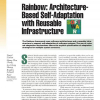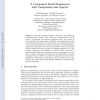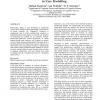73 search results - page 2 / 15 » Modeling Dimensions of Self-Adaptive Software Systems |
SASO
2009
IEEE
14 years 4 days ago
2009
IEEE
This paper introduces MOCAS (Model Of Components for Adaptive Systems), a generic state-based component model which enables the self-adaptation of software components together wit...
COMPUTER
2004
13 years 5 months ago
2004
any benefits. Most significantly, an abstract architectural model can provide a global perspective of the system and expose important system-level properties and integrity constrai...
WOSS
2004
ACM
13 years 10 months ago
2004
ACM
Components in a decentralised system are faced with uncertainty as how to best adapt to a changing environment to maintain or optimise system performance. How can individual compo...
CBSE
2006
Springer
13 years 9 months ago
2006
Springer
This paper presents AOKell, a framework for engineering component-based systems. This framework implements the Fractal model, a hierarchical and dynamic component model. The novelt...
IUI
1997
ACM
13 years 9 months ago
1997
ACM
Historically, efforts at user modelling in educational systems have tended to employ knowledge representations in which symbolic (or "linguistic") cognition is emphasize...



